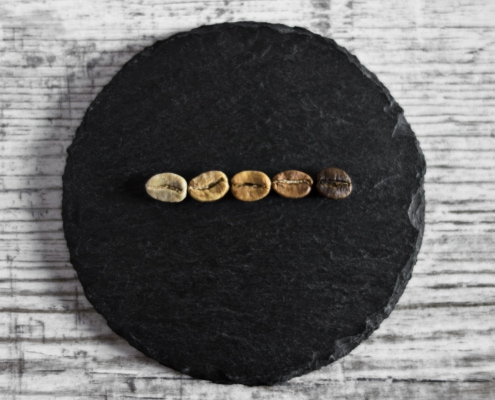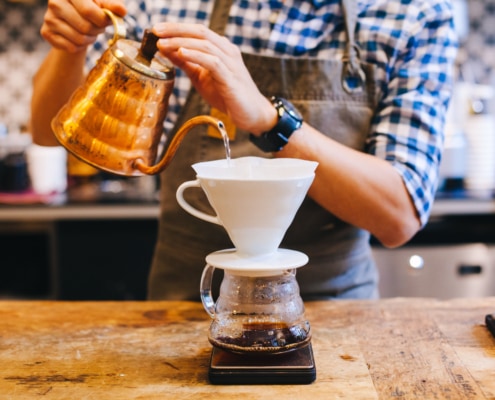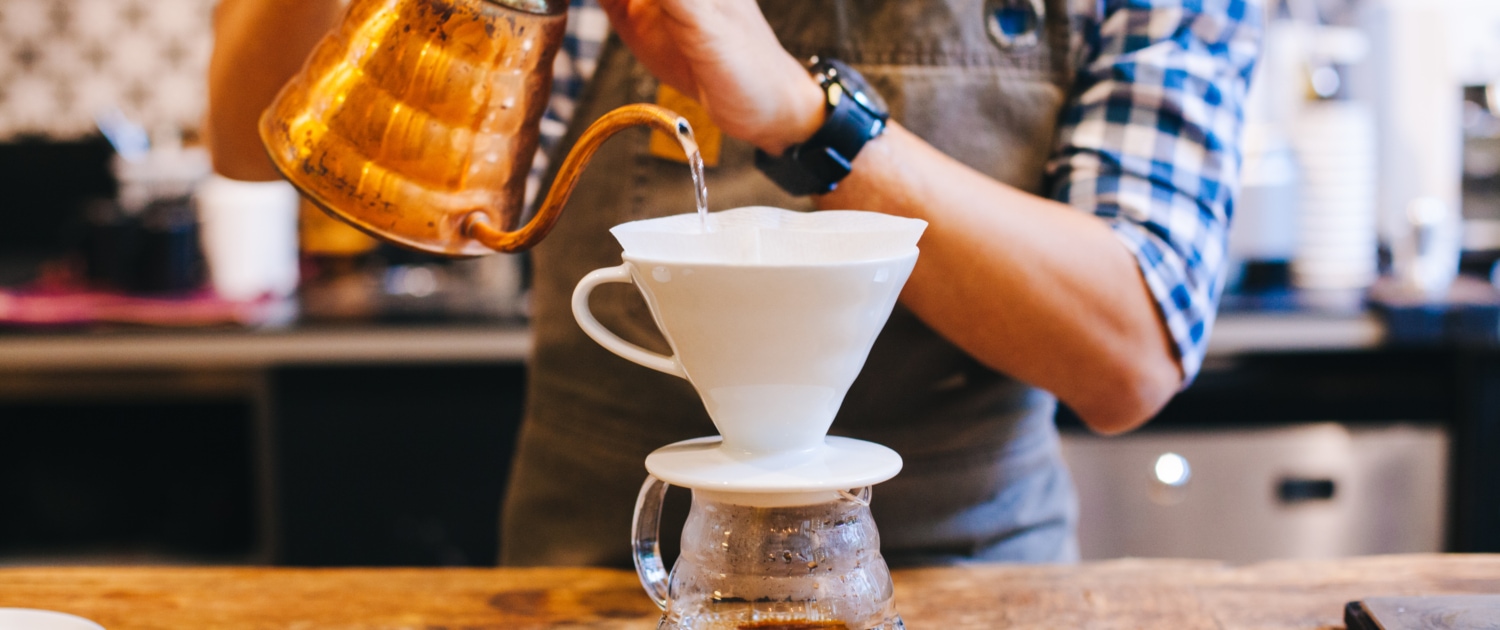What is Filter Coffee?
– A Complete Guide –
Have you had a coffee today yet?
I certainly did already. To be honest, I can hardly function and imagine a day without it.
There is a good reason why coffee is one of the most popular beverages in the world.
First of all, it simply tastes delicious in all of its great varieties. Secondly, the dark liquid additionally provides us with a lot of great health benefits.
Many coffee lovers even say that it makes us happier and live longer.
Furthermore, our vast and colorful ‘coffee universe’ gives us various ways on how to prepare our favorite brew.
Today, we will have a closer look at filter coffee in specific.
Actually, filter coffee is not exactly a new style in the wide world of coffee. In fact, there are even many places, where coffee filter is far more popular than espresso.
Also, we here in Thailand have a unique coffee culture of our own. And, is this not the entire beauty of our coffee world?
It offers us endless options to express and find our own coffee desires. Therefore, coffee connects us all, in one way or the other.
These days, many drinks are based on espresso. Nonetheless, filter coffee has always been widely popular and it will also continue to do so.
This is a coffee lover’s and barista’s guide to filter coffee.
Here is everything you need to know.
What is Filter Coffee?
Overall, the name, ‘filter coffee’, can actually be a little confusing.

Because in reality, virtually any type of coffee is essentially ‘filtered’ in some way. This also includes espresso.
Furthermore, people use the term, ‘filter coffee’, to describe a variety of different coffee making devices.
The most common ones are Pourover, French Press, Aeropress, Chemex, Batch Brewer, Syphon and many more.
In addition, there is also another terminology to describe this category of brewing. This would be ‘low-pressure brewing’.
Indeed, this is eventually the biggest difference of all these preparation methods compared to an espresso machine.
Namely, using low pressure in brewing for filter coffee is fundamental.
Typically, a usual espresso has a ratio of around 1:2 parts of coffee to water. Whereas, filter coffee far exceeds this and has around 1:16 parts coffee to water instead.
So, what do you think? How may this affect the overall flavor?
If we are comparing to an espresso, the mouthfeel of filter coffee is less ‘thick’. Overall, the filter coffee’s flavors are more subtle and detailed.
In other words, an espresso would be more like a whiskey. And, a proper filter coffee is more like a good wine.
Why Filter Coffee?
A few years ago and at most coffee shops, we would have mostly seen a barista work with the universally useful espresso machine.

However, this is actually changing during the recent years. More and more coffee menus are offering and advertising filter or batch brew again, now.
But why bother with filter coffee in a café? Why is it becoming more popular again?
The answer is quite easy and straight forward. It is because of its simplicity, hot freshness and instant availability.
Hence, many coffee shops started serving filter coffee to set them more apart from local competition. In the hope of attracting new and different customers.
In addition, having a couple of liters of filter coffee ready can also help during busy work hours.
You can quicker serve your regular or new customers. Who are just looking for black coffee with some milk or sugar in it, maybe.
But, it is also a great way of keep your coffee shop staff busy and motivated.
Generally, finding and, more so, keeping a good barista can be challenging. Therefore, keeping your coffee fresh and interesting for your staff is very vital as well.
This is why they love their job. They want to serve and make their customers happy in any coffee-related way they may desire.
What is the Filter Coffee’s Anatomy?
In general, a filter coffee tends to draw less acidity than an espresso.

On the other hand though, it typically highlights more intricate flavors of your coffee. This especially makes it a very popular brewing choice for single origin coffees.
It really enables the coffee drinker to fully appreciate and experience all of the characteristic flavors and aromas of coffee coming from a very specific region.
Furthermore, unlike an espresso, filter coffee is not as dense and distinctively layered. Consequently, coffee experts rather describe it as being clean, clear and consistent.
The reason is that filter coffee is allowed to absorb coffee oils and fragrances longer. Ideally, a coffee maker gives the process the time it needs.
Its flavors and aroma will develop in its own consistent time and pressure. In contrast, you would force this process with an espresso.
Furthermore and due to its lower acidity content, filter coffee usually has a milder mouthfeel. At least, when you are comparing it to the espresso.
How to Make Filter Coffee?
In some form or the other, filter coffee has probably been around for as long as coffee has itself.

It is the most basic of the ‘fresh’ coffee drinks.
The brewing method makes use of all different types of coffee beans. These beans have been ground up into a certain consistency.
The grinding process can either take place on spot or bought pre-packaged.
After the grinding, you are adding these ground beans to a paper filter. Next, boiling hot water is allowed to seep through the coffee and filter.
This results in a gravitationally-influenced extraction of plain, pure coffee. No other external pressure will be applied, as it is the case for the espresso for example.
That’s why the brewing method takes more time. You are literally supposed to give the coffee and brewing method the natural time, it requires.
Additionally, you are able to alter the eventual taste in two ways.
The first way is to adjust your coffee ground size. This can happen by either making the grind bigger or coarser. It allows for a far less bitter extraction of coffee.
Secondly, you can add external flavor factors. These include usual items such as milk, sugar or flavored syrups.
Overall and as we mentioned already, many people rely on their daily coffee and caffeine intake.
But they might not always have the time or motivation to prepare filter coffee.
The aspect of convenience is probably the biggest difference between filter coffee and instant coffee.
Which Coffee to Choose?
At the end of day, the choice of coffee depends on us and our own preferences.

With filter coffee, you can eventually work with any coffee type or variety. Nonetheless, there are a few additional points you may want to know or consider.
For instance, there is the single-origin coffee. This coffee type is becoming increasingly popular for many years already.
When it comes to single-origin coffee, filter brewing is probably the most suitable way. This way, you can fully experience all of the subtle flavors of a high-quality coffee origin.
As we said already, the type of origin is up to you. Many people like to choose coffee varieties that display a whole spectrum of flavors.
This may either be a crisp and clean sweetness from Colombia. Or maybe some deep and fruity flavors of natural-processed coffee from Ethiopia.
Eventually, it’s all of the characteristic differences that make our individual coffee experience so interesting.
In addition and when we are talking about coffee roasting. Many coffee lovers prefer a lighter ‘filter’ roast coffee.
Typically, it perfectly highlights the sweetness and acidity of the selected coffee then.
For filter coffee, many coffee consumers find darker roasts not very suitable. Because, the result can likely turn out to be more bitter and smoky.
Which Equipment to Use?
Overall, when making filter coffee, there are two main different techniques we can consider to work with.
-
Automated – Batch Brewing
In short, this method is faster, more consistent but also less flexible.
You have probably seen these brewers at many occasions.
This may sound surprising to you, but with good quality equipment and the right coffee. It is very much possible to make some seriously delicious coffee.
Batch brewers come in all different sizes.
For example, there are the rather small, domestic units that only have one setting.
And then, you can also find the more advanced machines. These are commonly having a lot more options and capacity.
Many professional coffee makers like to work with batch brewers.
Typically, they are much more consistent than manual filter coffee preparation methods. This is in terms of providing great quality over an extended period of time.
-
Manual Brewing
This method may be slower and less consistent. But, it is also more flexible.

Not only at home but also at a café, manual filter methods can work in busy environments as well. However, you will usually find it more challenging to manage and control.
Nonetheless, many coffee enthusiasts appreciate manually brewing filter coffee out of a very simple reason.
They can do it themselves. For many daily consumers, individually making their own filter coffee becomes a ‘ritual and habit’ they would not want to miss.
Furthermore, some filter coffee lovers believe that good coffee takes time. Indeed, it is the brewing and steeping time of a filter coffee that brings out its complexities.
Consequently, it is literally a cup to wait for to do its magic.
The entire process begins by wetting the coffee grounds. Next, you are waiting for the coffee to bloom. This will take around 30 seconds.
It allows the release of carbon dioxide. Overall, the degassing facilitates a better water flow during the process itself.
The remainder of process is usually called post-blooming. And, it typically lasts around 1 ½ to 2 minutes.
Final Thoughts – Filter Coffee
For me and many others, filter coffee is a great way to experience coffee. It truly has become a somewhat ‘holy ritual’ in many private households or cafés.
Filter coffee is especially interesting when trying out new single-origin coffee varieties on your own.
Some coffee enthusiasts would even argue that the filter process is also peaceful and calming.
At the end of the day, it all depends on you. And, whatever your own lifestyle and taste preferences may be.
So, how about you?
Are you regularly drinking filter coffee? What are your favorite ways or even ‘ritual’ to prepare it?
Is there anything else we should mention about filter coffee?
Feel free to share your thoughts and experiences with us.
Until then, stay safe, healthy and properly caffeinated.
Cheers!
Related Posts
 https://www.siamhillscoffee.com/wp-content/uploads/Coffee-Roast-Levels-1-scaled.jpg
1707
2560
Siamhillscoffee
https://www.siamhillscoffee.com/wp-content/uploads/coffee-logo.png
Siamhillscoffee2021-02-12 06:58:112021-03-03 11:44:54Coffee Roast Levels – The Differences Between Light, Medium and Dark Roasts –
https://www.siamhillscoffee.com/wp-content/uploads/Coffee-Roast-Levels-1-scaled.jpg
1707
2560
Siamhillscoffee
https://www.siamhillscoffee.com/wp-content/uploads/coffee-logo.png
Siamhillscoffee2021-02-12 06:58:112021-03-03 11:44:54Coffee Roast Levels – The Differences Between Light, Medium and Dark Roasts – https://www.siamhillscoffee.com/wp-content/uploads/What-is-a-Filter-Coffee-–-A-Complete-Guide-–-1-scaled.jpg
1707
2560
Siamhillscoffee
https://www.siamhillscoffee.com/wp-content/uploads/coffee-logo.png
Siamhillscoffee2021-02-12 06:44:562021-03-03 11:48:24What is a Filter Coffee? – A Complete Guide –
https://www.siamhillscoffee.com/wp-content/uploads/What-is-a-Filter-Coffee-–-A-Complete-Guide-–-1-scaled.jpg
1707
2560
Siamhillscoffee
https://www.siamhillscoffee.com/wp-content/uploads/coffee-logo.png
Siamhillscoffee2021-02-12 06:44:562021-03-03 11:48:24What is a Filter Coffee? – A Complete Guide –

